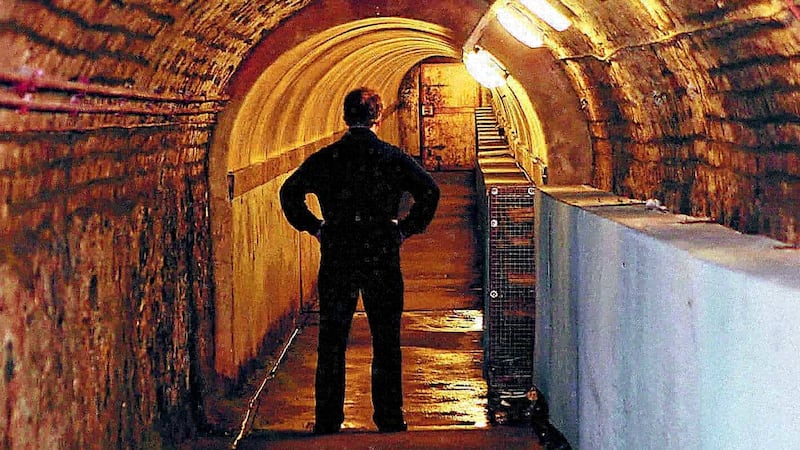Criminals were still being hanged in Northern Ireland until just over 50 years ago. Journalist Steven Moore, author of a new book on the subject, tells Jenny Lee about the macabre history of capital punishment in Belfast
SEVENTEEN men executed for their crimes were buried within Belfast's Crumlin Road Gaol in plain wooden coffins, the first in 1854, the last in 1961. This story of capital punishment is told in a new book by journalist Steven Moore.
Hanged at Crumlin Road Gaol is more than a chronological account of murder, trial and execution; it is a remarkable story, often sad and gruesome, recounting many quirky and fascinating tales.
It also documents changes in society - in methods of execution, in what was considered moral and in the justice system. "The book deals with the way society used to treat crime and criminals and how much we have moved forward. Every story is fascinating and each is a human tragedy," Moore say.
Brought up in north Belfast close to the city's most infamous jail, Moore has memories of prisoners waving to children playing below.
As night editor at the News Letter, a story on an execution at Crumlin Road Gaol and readers' reaction to it fuelled Moore's interest in the subject. Shortly after it's closure in 1996 he was given a personal tour with the governor.
Now a tourist attraction, the former prison is an important reminder of our history; the condemned cell and death chamber are the highlights of most visitors' experience.
The first two executions at the gaol had been public affairs, with tens of thousands gathering on Crumlin Road to see.
First to feel the noose of the gaol's executioner was soldier Robert Henry O'Neill, hanged in 1854 for the murder of a corporal at Victoria barracks in Belfast.
He was followed in 1863 by Daniel Ward, who had split the head of Charles Wilgar with a stone and pushed him into the River Lagan at Shaw's Bridge - for £2 and a watch. In 1868 the law was changed, the public excluded from witnessing what had been a popular spectacle. Of those later executed, the two known to most are IRA man Tom Williams, put to death in 1942 for shooting a police constable during the Second World War, and Robert McGladdery, the last man to be hanged in the jail, for killing teenager Pearl Gamble.
William Woods was a 58-year-old tramp who was executed in January 1901. Moore says he was a "fascinating character" and the only man executed at Crumlin Road Gaol to have previously been convicted of another murder. "Obviously being well fed and looked after, he enjoyed his first time in gaol," Moore says. "The second time he was the only prisoner to put on weight. Then it came to the bit where he found out he wasn't going to escape the rope this time."
Eddie Cullins is thought to have been the only Jew hanged in Ireland, for the murder of a fellow circus performer. "One of the peculiar things is that his victim's identity wasn't known - he was found naked in a field. Going by his appearance, the authorities buried [the victim] in a Jewish cemetery. It subsequently turned out he was an Arab Muslim and his body was exhumed," Moore says. The impact of the execution process on those involved in carrying it out it is explored in the book. "I interviewed one of the death watch wardens many years after he had served in that capactity and he was still quite emotional," Moore says. "I phoned up one of the prison chaplins who had attended an execution. He was quite sharp with me on the phone and said he had spent years trying to forget about it and didn't want to talk about it." Capital punishment may seem outdated but it is still used across the world, including the United States.
In the past year alone, research from Amnesty International has shown a 15 per cent global increase in executions. China is thought to execute more than 1,000 people a year, with at least 778 other executions having been recorded in 2013.
Moore finishes his book with a quote from executioner Albert Pierrepoint, who in his career carried out 550 hangings. "The fruit of my experience has this bitter aftertaste; that I do not now believe that any one of the
hundreds of executions I carried out has in any way acted as a deterrent against future murder. Capital punishment in my view, achieved nothing except revenge," he wrote in his 1974 autobiography. Moore agrees with Pierrepoint and with Lord Gardiner, who said during a 1969 House of Lords debate on hanging: "I think that human beings who are not infallible ought not to choose a form of punishment which is irreparable."
* Hanged at Crumlin Road Gaol The Story of Capital Punishment in Belfast by Steven Moore is published by Colourpoint Books, priced £9.99. Available in bookshops or from colourpointbooks.co.uk.


